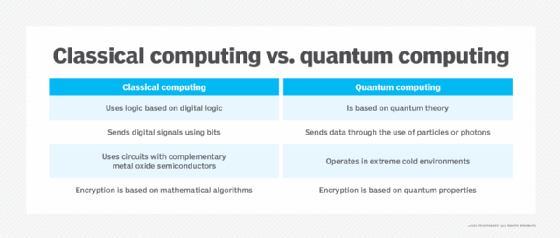Quantum computing ecosystem grows with Accenture, QCI moves
A quantum computing ecosystem is taking shape. Quantum methods may find initial applications in solving optimization challenges across various industries; other IT channel news.
Alliances have begun to emerge around quantum computing, with companies such as Accenture and Quantum Computing Inc. building partner relationships.
The moves provide evidence of a quantum computing ecosystem coalescing around hardware, software and service provider companies. Quantum computing, still in its early days, aims to employ quantum mechanics to solve problems that classical computing would struggle to address.
Accenture this week unveiled a multi-year relationship with IonQ, which offers its quantum computer systems through the Amazon Braket managed quantum computing service, Microsoft Azure and Google Cloud. The collaboration draws upon Accenture's research in quantum technology and industry expertise with IonQ's technology.
The IonQ partnership aims to prepare clients across industries for the arrival of mainstream quantum computing, said Carl Dukatz, global quantum lead and associate director in Accenture's Technology Incubation group.
 Carl Dukatz
Carl Dukatz
"While quantum technology is still in its earlier stages of development, we anticipate the first enterprise applications leveraging quantum approaches to be on the near-term horizon -- largely because working in quantum inspires many types of new solutions," Dukatz said.
The Accenture-IonQ partnership seeks to accelerate quantum computing business experimentation, which takes place internally and in conjunction with customers. This approach involves discovering viable quantum problems in a three-step process, Dukatz noted:
- creating new or using a set of preprogrammed quantum algorithms;
- identifying whether those algorithms effectively replace classical computing implementations; and
- rapidly piloting and deploying a quantum-enabled application to demonstrate the functionality.
Quantum Computing Inc. (QCI), meanwhile, launched a partner program around its flagship Qatalyst software, which lets organizations send computational problems to quantum systems available through Amazon Braket. The software supports purely quantum processing, but it also lets users augment classical computing with quantum technology.
The Leesburg, Va., company's QCI Partner Program lets participants provide access to Qatalyst as a service, which offers classical and quantum computing from IonQ, Rigetti Computing and D-Wave Systems. QCI's partners include Setmovision, an IT solutions provider in the Netherlands.

As quantum computing ecosystem partnerships evolve, some of the early activities may form around optimization problems, which occur across a range of industries.
"The advantages of quantum computing over classical computing are perhaps most apparent when solving optimization challenges," Dukatz said. Chemistry simulation in pharmaceutical research ranks among the primary areas in which quantum computing shows promise, he added.
Accenture has also explored applying quantum methods to optimization in other fields. As examples, Dukatz cited the use of quantum computing to identify the most cost-effective route for shipping goods and determine the most efficient way to extract resources from a mine.
Hosting sees strong growth
Companies providing infrastructure for hosting and related services generated 26% year-over-year growth in the second quarter of 2021, according to estimates released this month by the Census Bureau.
The hosting sector expanded to $64.2 billion in Q2 2021 revenue compared with $50.9 billion for Q2 2020, a period when the industry felt the economic brunt of the COVID-19 pandemic. Hosting revenue grew 4.7% in the second quarter compared with Q1 2021.
The computer systems design category also expanded, but a lower rate. That sector, which includes custom software and systems integration, grew 7% year over year and 3.2% quarter over quarter.
The services industry, overall, grew 20.1% year over year and 3.9% quarter over quarter, the Census Bureau reported.
Rebranding: 5thColumn, Central get new looks
5thColumn, a cybersecurity MSP, has rebranded as UncommonX, a move that includes a new website and logo. UncommonX also unveiled its Business Operations Security Suite, which the company describes as a propriety threat and intelligence platform. The nine-year-old Chicago-based company works with midsize organizations.
In the United Kingdom, Central has rebranded and launched a new website. The company, located in the Greater Manchester area and previously branded as Central Networks and Technoloiges, was founded 30 years ago.
Motivations for rebranding a company include updating the image of a long-established service provider or reflecting a business' evolving service offerings.
Partner roster updates
- Google Cloud tapped multiple systems integration partners to support the launch of its Supply Chain Twin offering, which lets businesses create a digital twin of their supply chains. Partners include Deloitte, Pluto7 and Tata Consultancy Services. Customers can work directly with such partners to integrate Supply Chain Twin and relevant data sets into their infrastructure, according to Google.
- GFT, an IT services and software engineering firm, partnered with core banking system provider Thought Machine to co-develop and launch a digital bank offering. BankLiteX, which runs on AWS, lets customers develop the initial iteration of a cloud-based digital bank in less than 12 weeks, GFT said. GFT, based in Stuttgart, Germany, is expanding in North America, having previously built a Latin American business.
- US Signal, an IT solutions provider based in Grand Rapids, Mich., used SoftIron Ltd.'s storage appliance to expand its storage-as-a-service infrastructure. The initial deployment increases US Signal's capacity by more than a petabyte, according to SoftIron. Specifically, the infrastructure update involves SoftIron's HyperDrive appliances, which are based on Ceph open source storage software.
- Deepwatch, a managed security services provider based in Denver, added SentinelOne's endpoint security technology to its managed detection and response (MDR) offering.
Partner program launches and updates
- Zoom Video Communications, based in San Jose, Calif., unveiled a pilot program that lets select resellers sell Zoom Phone Bring Your Own Carrier (BYOC) licenses. The company expects to enable a wider pool of resellers to offer Zoom BYOC licenses by the end of 2021. The BYOC licenses let customers redirect existing voice circuits to the Zoom Phone cloud, keeping their current PSTN service providers.
- Sumo Logic, a log management and security information and event management vendor, expanded its partner network in Europe. The company said it built out its long-standing Europe, Middle East and Africa (EMEA) presence with MDR provider ESentire and added Computacenter to its U.K. partner program. Sumo Logic also added E92plus and ICOS to its distributor roster.
- Westcon-Comstor, a distributor with global headquarters in Tarrytown, N.Y., said it expanded its lineup of EMEA security partners with Noname Security, an enterprise API security firm.
- DTG, a Wilmington, Mass., company that provides power systems and mobile workstations, launched a channel partner program. The company, which primarily sells through channel partners, works with VARs, systems integrators and automatic identification and data collection solution providers.
- Park Place Technologies, an IT infrastructure services and products company based in Cleveland, rolled out a partner program and portal. The three-tier partner program offers marketing and sales support resources, co-selling opportunities and training, among other features. The program also provides a network management partner specialization track. The portal has access to deal registration, co-brandable marketing assets and a dashboard for tracking KPIs.
- American Tower, a real estate investment trust that owns data centers, unveiled a partner program. The Boston-based company offers channel partners access to its Atlanta colocation data center and edge data centers in Atlanta; Austin, Texas; Boulder, Colo.; Denver; Jacksonville, Fla.; and Pittsburgh.
Other News
- SoftwareOne Holding AG, a software and cloud technology solutions provider based in Switzerland, acquired HeleCloud, an AWS partner and MSP with headquarters in the U.K. The deal lets SoftwareONE bolster its AWS capabilities in EMEA, according to the company. HeleCloud, founded in 2016, has itself grown through acquisition: HeleCloud in 2019 purchased OlinData, a consulting firm in The Hague, Netherlands. SoftwareONE joins the ranks of cloud consulting and MSP buyers, which have made 2021 an active year for transactions.
- NWN Carousel, a cloud communications service provider based in Waltham, Mass., completed the integration of Carousel Industries, a company it acquired four months ago. The merged company's portfolio includes unified communications, contact center, security, intelligent offices and virtual collaboration, and integrated devices. NWN Carousel said it sees growing use of cloud communications services providers, an emerging partner business model that deploys, secures and manages customers' collaboration platforms.
- D&H Distributing, a distributor based in Harrisburg, Pa., plans to hire 50 people in addition to the 100 positions the company had earlier forecast it would fill. D&H will hire people in such areas as cloud, professional services, security, MSP services and unified communications, the company said. D&H also aims to expand its vendor line card and provide additional credit offerings.
- Kaseya Corp., which provides IT and security management products for MSPs, said it plans to expand its office space in Vancouver and hire 75 tech workers by end of 2022. Elsewhere in Canada, Kaseya said it will support Unitrends and Spanning backup customers in Quebec and Ontario data centers.
- Datto Holding Corp., an MSP software and security firm based in Norwalk, Conn., rolled out a business continuity and disaster recovery product for Microsoft's cloud platform. Datto Continuity for Microsoft Azure uses the private Datto Cloud as a secondary layer of protection. This approach lets MSPs recover public cloud data through multi-cloud replication, Datto said.
- SkyKick, a no-code/low-code cloud automation software vendor based in Seattle, closed a $130 million financing round. The company said it will use the funding to invest in its products for IT services providers. The company's customers include CDW and SHI.
- Equinix partners in India can now support customers using Equinix facilities in that country. The data center and interconnection company earlier this month acquired GPX Global Systems, a deal that includes two data centers in Mumbai. Previously, Equinix partners working with Indian customers used data centers in other markets where Equinix had a presence. Equinix's India-based partners include HCL Technologies, Infosys and Wipro.
Executive appointments
- Inoapps, a systems integrator and Oracle partner based in Aberdeen, Scotland, hired four executives as the company embarks on an expansion campaign. The company appointed Debra Lilley as vice president of delivery growth and excellence. Lilley was previously the Oracle Human Capital Management practice lead for Accenture's Oracle Business Group Europe. Greg Guido joined Inoapps as senior vice president of application sales for North America. He was previously an applications sales manager at Oracle and also worked in the Oracle partner network. Deborah McFarlane has been appointed as head of talent acquisitions, and Duncan Davies joined the company as Human Capital Management practice director.
- Involta, an IT service provider and consulting firm based in Cedar Rapids, Iowa, promoted three executives. Josh Holst becomes vice president of cloud services, Mark Cooley took the post of vice president of security and compliance, and David Humes II was named director of product management.
- MorganFranklin Consulting, a finance, technology and cybersecurity advisory firm based in Washington, D.C., appointed Zubaid Kazmi as a managing director in the company's cybersecurity practice.
- Prolifics, a consulting firm and MSP based in Orlando, Fla., hired Dennis Martin as global head of sales. Martin was previously executive sales leader at Hewlett Packard.
- BitTitan, a cloud migration and managed services automation vendor based in San Diego, named Paul Nguyen as vice president of product and engineering for Perspectium, a ServiceNow specialist BitTitan acquired in June. Nguyen co-founded Perspectium.
- MSP360, a backup and IT management product vendor for MSPs, appointed Amit Kumar as vice president of operations. Kumar was previously strategic finance and analytics manager at Constant Comment.
Market Share is a news roundup published every Friday.







